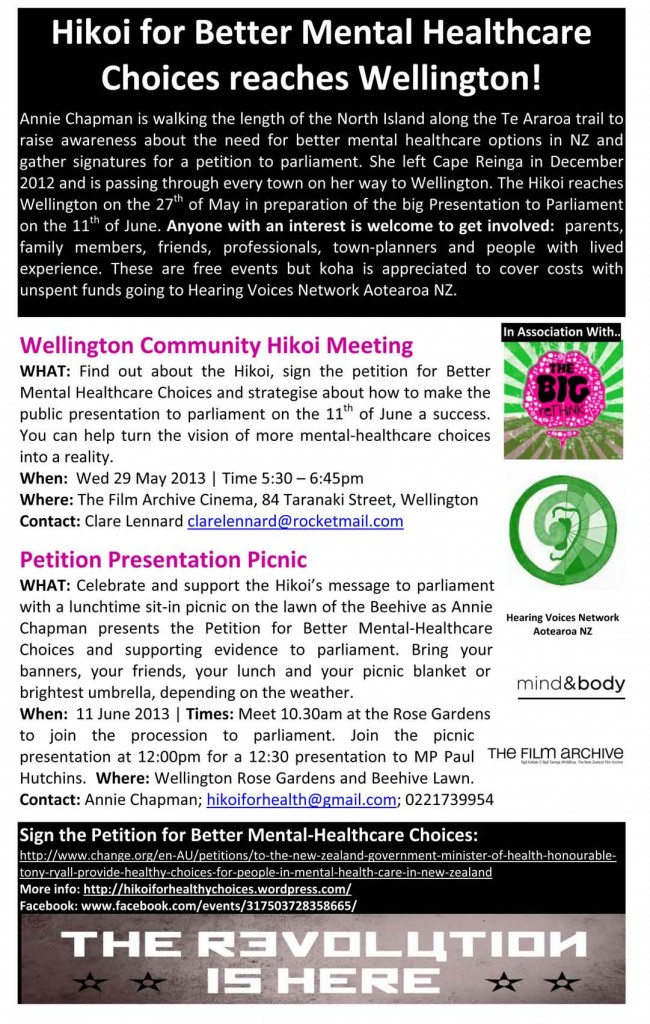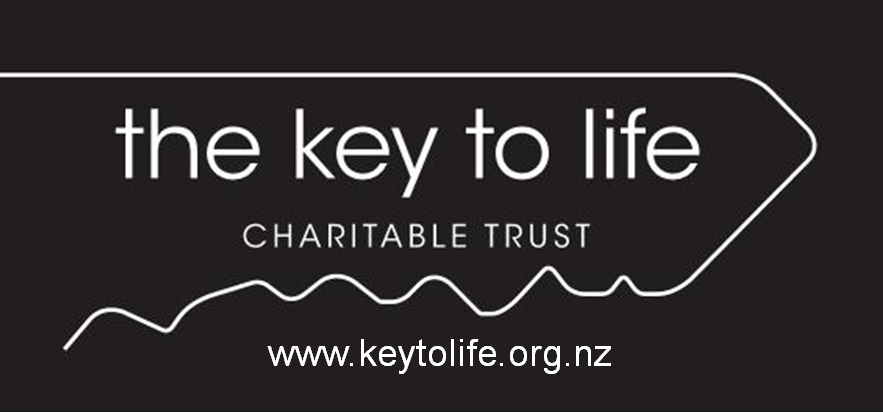Report: Mike King’s: “Community Korero” – Depression & Suicide Prevention
Feedback report by Aorangi Kawiti, Mana
Whangarei, Monday 8th– 9th April 2013
Support Team: Whangarei Coordinator: Aorangi Kawiti (Mana), Isha Waetford (Mana Rangatahi) Deeanna Matiu (Mana Admin Work Experience), Marama & Rowan Waddell, Janey Tana (Mana Wahine- Tane), Hone Tana (Man Alive), Shahni Bright (The Pulse), Arthur Harawira (Mana Kaikohe)
More than 150 people from across the Whangarei community, education, health, development & social sectors flocked to hear Mike King’s brutally honest korero on his very personal experience with depression, drug & alcohol addiction & suicide. Each of the three venues packed to capacity, The Hut at The Pulse, the May Bain Room at the Central Library and the Mana office, despite late changes in venues and media reports.
Sharing his story helped others to open up and share their story, identifying with someone who’s been there and no longer feeling so alone. Accepting himself, after a lifetime of longing for the acceptance of his father and everyone else when he couldn’t get that, is pivotal to who he is today and his ability to have a conversation about a subject as serious as suicide and depression that most are afraid to bring up, in case somehow talking about it may spread the contagion, bring more suicide or increase depression. Guess what? Talking freely about depression and suicide in a safe and caring environment is amazingly liberating and invigorating. Sharing the grief of suicide is healing, releasing us from blame and guilt when we understand we have done all we could to prevent it and accepting that despite our best efforts we may not have been able to stop someone we love dying through suicide. Empowering us beyond this is the hope that propels to do all that we can to save a life from suicide, starting with the conversation: “Are you okay?” “Do you need help?” “I’m here for you” “I care about you”…then staying till they get the help they need. We need to believe people when they let us know they are suffering. We can make it easier for people to talk to us, by being more open about ourselves and our own struggles.
Humour by nature, as a survival technique and a tool of communication, is huge in Mike’s story, opening a window into his life that is warmly empathetic of young fullas growing up and easily related to. Mike’s the ambassador for Key to Life, the charity behind The Nutters Club. The feminine view is well represented by Miriam Larsen-Barr, the Korero coordinator, Engage Aotearoa Service Director, www.engagenz.co.nz website creator and administrator with a handy MA (1st Class Honours) in Psychology. Youth team member Tai Tupou, Head Trainer/ Director of RIPPED Training, No1 Boot Camp Trainer 2012 comes highly recommended by the youth in the audience, with a good dose of coconut oil as a natural remedy for depression (also recommended in the korero).
Here is a list of recommendations that came from the discussions at the Korero
1. Talk about our problems with each other so we aren’t dealing with the tough stuff alone
2. Take people’s feelings seriously – remember that young people have the same emotions as adults
3. Don’t be afraid to ask someone if they are okay – we don’t need to fix their problem, we just need to listen and show we care
4. It is okay to come right out and say ‘are you feeling suicidal?’ – asking this question does not put ideas into someone’s head, it gives them an opportunity to tell us about how they are feeling. Suicidal feelings are hard to talk about and asking the question makes it easier to do.
5. Talking about why people feel suicidal is important, talking about how people attempt suicide is unhelpful as it accidentally shares methods – if someone is suicidal though, we need to know enough about what they are thinking to keep them safe and protect them from having the means to follow through on any plans they might have to act on their thoughts, so it is okay to ask people whether they have a plan and what that plan is
6. Talk and listen to our own children the same way we would our friend’s children: When we talk to our children, listen to their hurt and try to get past our own hurt as parents that we have not protected them from everything
7. Talk more about our own problems and how we get through them – when we are real it makes it okay for other people to be real, but silence brings shame and increases stigma
8. We need to validate each other more, look for the positives in each other and reflect them back
9. Be aware that antidepressant medication can increase suicidal thoughts and feelings for a time and report to your doctor if you notice this
10. For people who are suicidal and depressed, nutrition can be really important. A number of Korero participants mentioned that eating coconut oil helped them improve their moods.
11. Parents and teachers need to be on Facebook so they can respond to risky posts and offer their support – young people often say things on Facebook that they can’t say in person. Be there.
12. We need to normalise mental-health problems and reduce stigma so people understand these problems are common and that they can recover from them.
13. We need to make it okay to make mistakes
14. We need to stop thinking it is someone else’s problem to provide the support, that it is not our business and that what happens in a family should stay in the family – we are smaller families inside the one bigger family of our community, it is okay to help people from other families or to seek help from people in other families
15. We need to give ourselves permission and our children permission to take our masks off, ask for help and show we care.
16. Be persistent – if we feel suicidal we need to keep asking for help until we find the person who can give it to us. If we know someone is feeling suicidal we need to keep offering our support until they are able to accept it.
17. Get help – there are heaps of supports available from counselling and therapy to phone lines like 0508 TAUTOKO, youth groups like The RAID Movement and whanau supports like Supporting Families.
18. Support needs to be individualised and take wairua/spirituality into account for people who have a spiritual perspective
19. Find and share information about mental health, suicide and recovery resources – a lot of the info that was available at the Korero resource table is available online at the National Depression Initiative, The Low Down, The Mental-Health Foundation and the EngageNZ websites.
20. We all need to feel accepted and included. Let’s accept and include each other more. What we do makes a difference.
Comments from Participants
“Your korero touched my heart.”
“I acknowledge your korero on suicide and you’re right, all the money in the world won’t fix it but talking will.”
“Tautoko your mahi and korero. Yes! We need to talk, hug, awhi etc to get the message out – “you are not alone”.”
“Absolutely fantastic korero, learned so much and totally believe sharing stories is a wonderful way of healing. I’m so glad our team attended.”
“The talk the other day was brilliant. Well really it was a discussion. It was very open, honest, inclusive and well worth taking the time to go to. Important things we got out of it are, talk, have a conversation, be yourself and know that you do not have the right to know if someone else likes you or not. Thanks very much I’m sure everyone took something useful away with them.”
Outcomes
Given all the shared conversations by people who care and the empathetic response of support from the community at this time when we are sadly aware of the deaths to suicide in Whangarei last year and increasingly over the past few years, it is with hope inspired by this presentation and the collective support it has received that we are glad to report some very real and positive results from this:
- Conversations were shared about depression, suicide and recovery in our community
- Conversations are continuing with whanau and community
- Increased information and awareness in the community (Community Resources Directory of recovery services online at EngageNZ, distributed at meetings for people to add to and have available in a prominent place at their service for people to access)
- Service providers and clinicians engaging to support whanau and community
- Survivors of Suicide Support Group, to meet monthly, for people who have lost someone to suicide, considered suicide and survived or are currently struggling with these feelings. We are engaged in planning and partnership activities to ensure this will be a safe and supportive group, with the intention of being able to begin in June or July.
Ma tatou tahi e awhi e hapai te kaupapa nei. Through all of us working together we share.
Report prepared by Aorangi Kawiti
Contact: kawiti.aorangi@gmail.com, 0226202262








